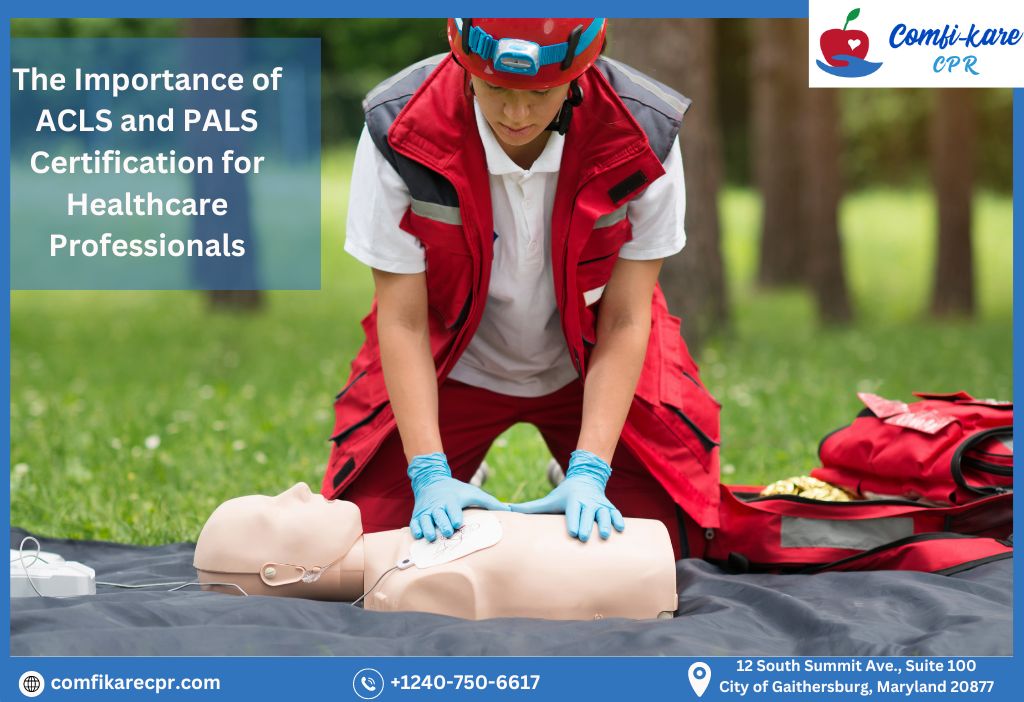
In today’s healthcare world, where every second counts, ACLS/PALS certifications are very important. These certificates are not just normal qualifications. They are providing healthcare professionals with the skills and knowledge important so that they can properly address life-threatening situations.
In this post, we’ll explore why such certifications are so important. We will also get to know their contributions towards both patient outcomes as well as professional competencies.
What Are ACLS and PALS Certifications for Adults?
ACLS certification provides lifesaving techniques intended for use during emergency medical situations like cardiac arrest, stroke, or heart attack. Topics included are advanced airway control techniques, ECG rhythm analysis as well as pharmaceutical analysis studies among others.
PALS certification was specifically created for pediatric care. This training emphasizes a systematic approach to dealing with emergencies related to respiratory issues, shock, or cardiac events in pediatric patients – equipping healthcare providers with skills necessary for quickly recognizing critical patients in critical condition, treating them effectively, and offering lifesaving interventions in an emergency.
Enhancing Professional Competence
Certification as ACLS or PALS is an excellent way to advance professional competence. Understanding current medical practices and guidelines is vitally important for doctors, nurses, and paramedics; ACLS/PALS courses adhere to current protocols endorsed by major health organizations like the American Heart Association in their training protocols.
These programs provide healthcare professionals with hands-on exercises and simulations designed to sharpen and perfect their skills in an environment controlled by healthcare experts. Experiential learning like this is invaluable when handling real emergencies – individuals certified are better positioned to provide high-quality patient care, reduce error risk, and optimize outcomes.
Improving Patient Outcomes
ACLS and PALS certifications are doing great to improve patient outcomes. Dealing with cardiac or respiratory emergencies requires you to pay immediate attention so that you can avoid death. Those healthcare professionals who are certified with one or both certificates can understand the signs of distress quickly. After this, they can initiate lifesaving measures as part of an efficient team effort.
Every second counts during critical situations. In such situations, ACLS and PALS provide a framework to help with quick decision-making by team members.
Maintain Medical Standards
Healthcare facilities should follow medical standards and regulations properly. The reason behind this is that they can safeguard patients. ACLS and PALS certifications help medical facilities follow the standards. Many hospitals want these certifications as a part of the hiring process. The reason is that their staff need to have every important skill. Are you wondering why? They can then handle emergencies without any hassles.
Healthcare professionals must regularly recertify their ACLS and PALS certifications to stay updated on the latest advancements in pediatric and emergency cardiovascular care. This ongoing recertification demonstrates their dedication to maintaining high levels of competence and professionalism.
Acquiring ACLS and PALS Certifications Can Open New Career Horizons
Earning ACLS and PALS certifications can open up numerous career prospects for healthcare professionals. These certifications are often necessary for advanced clinical positions within critical care units, emergency departments, and pediatric units requiring advanced care expertise. Acquiring these credentials makes healthcare providers more marketable while showing greater expertise than they would otherwise demonstrate.
Employers seek out certifications like ACLS and PALS because employers know these candidates have undergone intensive training and assessments. Acquiring these credentials can play a significant role in career advancement by opening doors to more specialized jobs with higher salaries.
Building a Culture of Safety and Excellence
ACLS and PALS programs play a key role in creating a culture of safety and excellence within healthcare institutions. Certification should become standard practice among staff to promote high standards of care that improve teamwork, communication, and emergency handling procedures.
Institutions that prioritize ACLS and PALS certification demonstrate their commitment to providing their patients with exceptional healthcare, building their reputation while drawing new patients in, and cultivating trust within the community.
Enhancing Interprofessional Cooperation
ACLS and PALS certifications not only advance individual skills but also foster interprofessional cooperation. Healthcare providers working together in an emergency is crucial to ensure smooth communication and seamless treatment of patients. ACLS and PALS emphasize roles and responsibilities for every team member so that everyone understands their duties efficiently. Taking this interprofessional approach improves quality care while team members work to save lives!
Detailed Examination
Acknowledging the structure and components of ACLS and PALS training is essential to comprehend its value. ACLS certification mandates the study of advanced cardiovascular life-support techniques, pathophysiology, and pharmacology; scenario-based training simulates emergencies to provide healthcare workers with practical scenarios that can be applied to enhance efficiency during real emergencies.
PALS certification involves intensive training that specializes in pediatric assessment and management. Healthcare providers learn to quickly diagnose and treat life-threatening conditions like respiratory distress or failure quickly. PALS emphasizes age-appropriate equipment and interventions so professionals are ready to handle pediatric emergencies with precision and care.
Updates and renewals of ACLS and PALS certifications are completed periodically to ensure healthcare providers remain current on best practices and guidelines related to emergency care. As research and technology continue to advance rapidly, continuing education plays an invaluable role. By maintaining ACLS and PALS certifications healthcare providers demonstrate their dedication towards continuous improvement and excellence.
ACLS and PALS programs also impart valuable skills in teamwork and communication, which are crucial components to an emergency intervention’s success. Collaboration among team members can greatly influence its outcome; ACLS and PALS highlight each person’s importance so everyone can respond swiftly under high-pressure situations.
Conclusion
ACLS and PALS certification is essential for healthcare professionals committed to providing lifesaving, high-quality care. Certification enhances professional competence, improves patient outcomes, ensures medical standards compliance, opens doors for career advancement opportunities, promotes interprofessional collaboration, and fosters interprofessional collaboration. Achievement of ACLS or PALS certificates shows a healthcare provider’s dedication and readiness in responding to critical situations; furthermore, these certificates help evolve with the healthcare landscape ensuring healthcare professionals possess the knowledge and skills to provide optimal care that saves lives.
ACLS and PALS certifications go beyond simply honing technical skills; they foster an environment for continuous learning, teamwork, and excellence in healthcare. By certifying healthcare providers as ACLS or PALS professionals, these certifications ensure patients always receive superior care – saving lives while improving outcomes for them!


